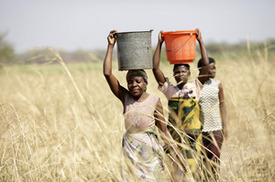Malawi strives for family planning budget line
Published on April 30, 2012 at 5:06 PM by FACE OF MALAWI
Malawi has plans to include a separate budget line in the Ministry of Health for family planning services which would ensure undisrupted supply and reduce overreliance on donors.
A separate budget line for family planning services is an international recommendation which Malawi has failed to adhere to.
Speaking at a training workshop for journalists in Zomba on Friday ahead of the National Leaders Conference on Family Planning, Population and Development next month, Reproductive Health Unit officer Jean Mwalabu said the Ministry of Health family planning goal of ensuring accessibility, acceptability and affordability, there was a need for reliable supply of the commodities.
Malawi has a high unmet need of women who would like to use family planning methods but are unable to due to availability and affordability problems.
“In the absence of the budget line, the Ministry of Health uses funds from the sector wide approach (Swap) and the priority is always on curative services meaning contraceptives become second choice,” Mwalabu said.
Countries in the region which have a separate budget line for family planning include Kenya which sorely relies on locally sourced funding, Mwalabu said.
The most popular family planning methods, according to the Malawi Demographic and Health Survey of 2010 are injectables at 25.8 per cent followed by tubal ligation at 9.7 per cent then pills at 2.5 per cent.
Family planning has been identified as the key to reducing maternal deaths, speeding up economic development and improvement of overall status of women and children.
Government plans to bridge the gap between family planning use and the unmet need by 2020 which could mean 7,000 maternal deaths avoided and 354,000 child deaths avoided.
The May 8-9, 2012 national leaders’ conference on family planning, population and development to be held in Lilongwe seeks to reposition family planning in the country’s development so there is increased access to all women who want to delay or space childbearing.
Family planning is now under the maternal and child health sub-theme in the Malawi Growth and Development Strategy Two paper.


